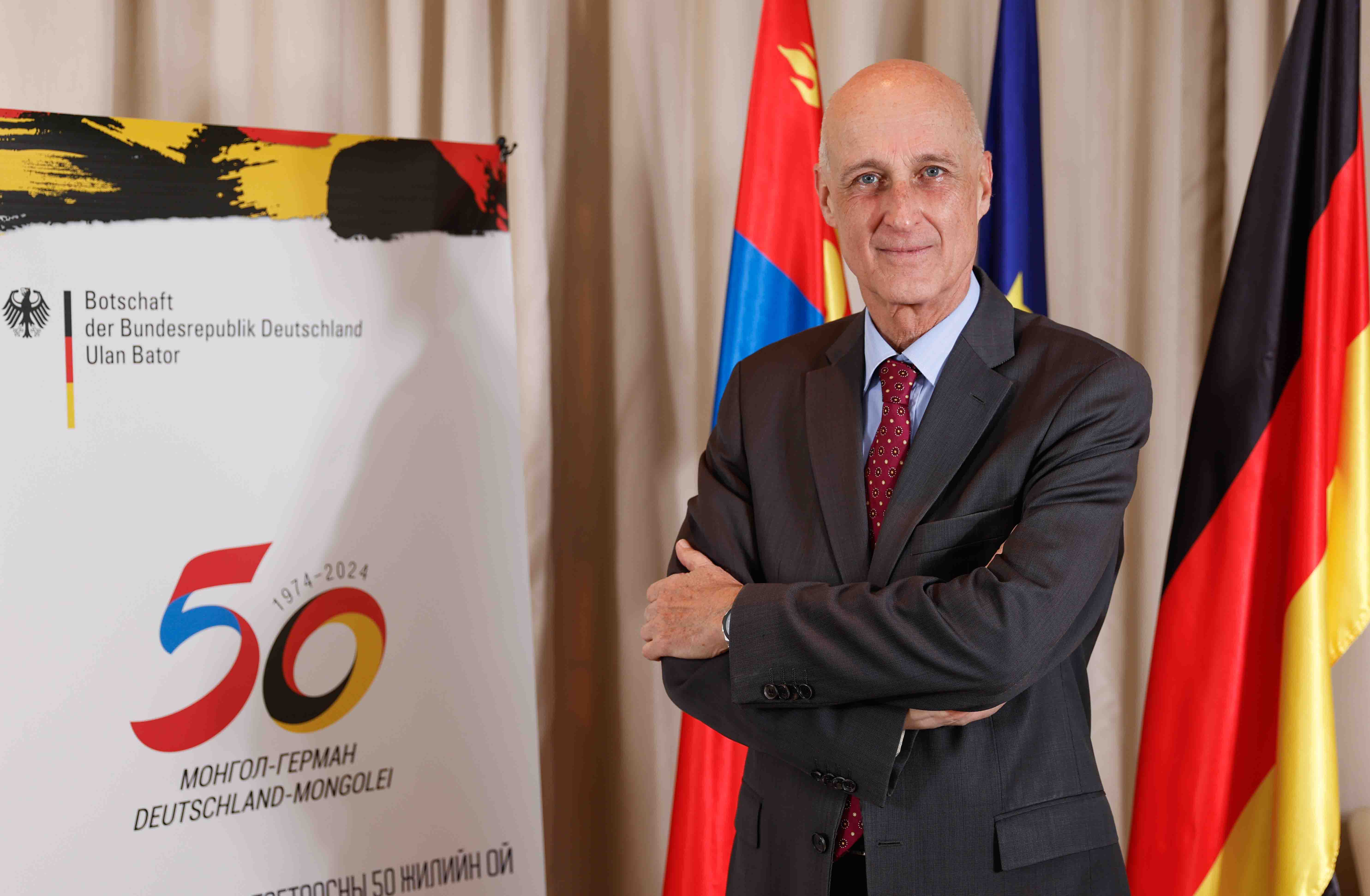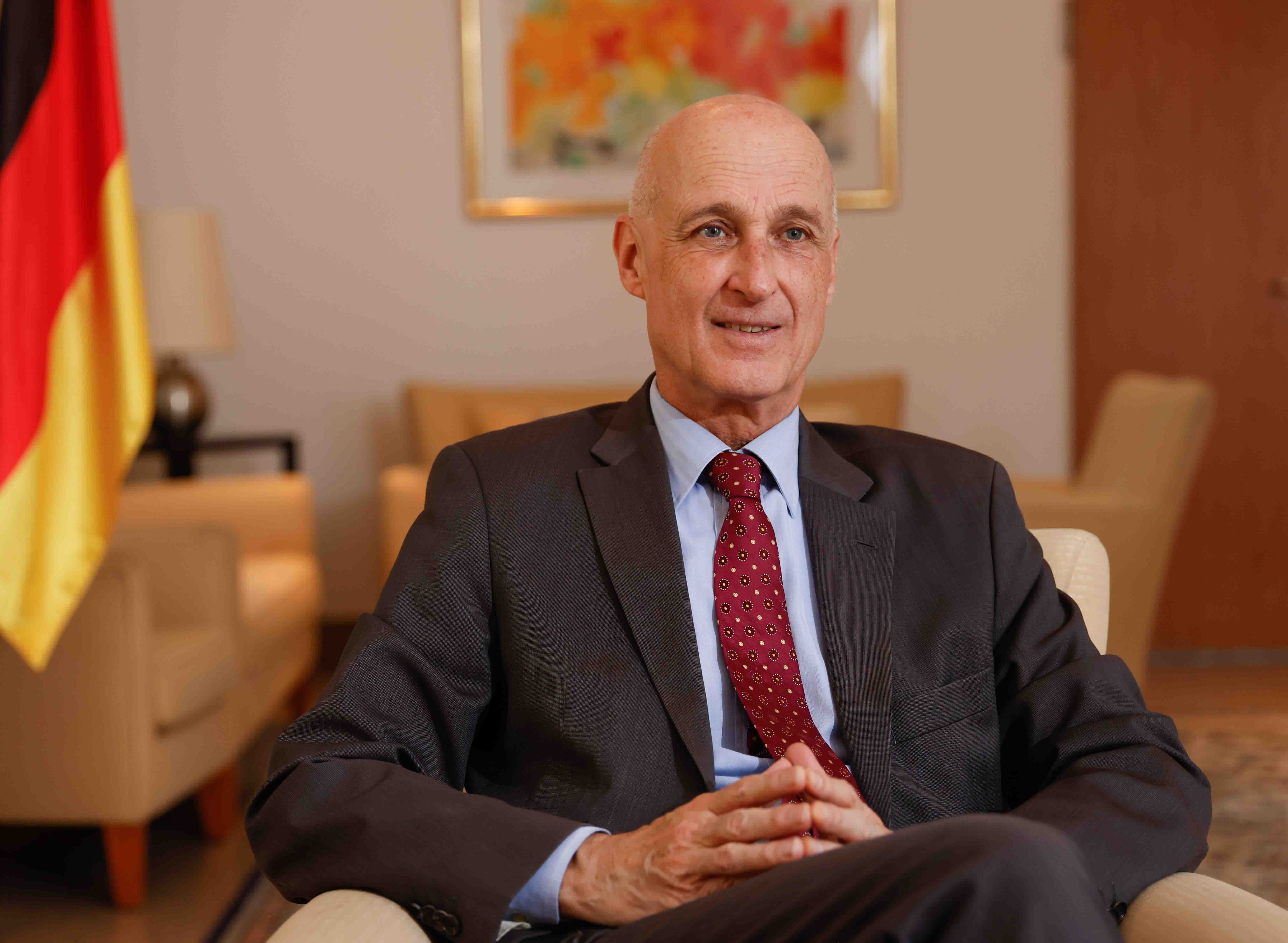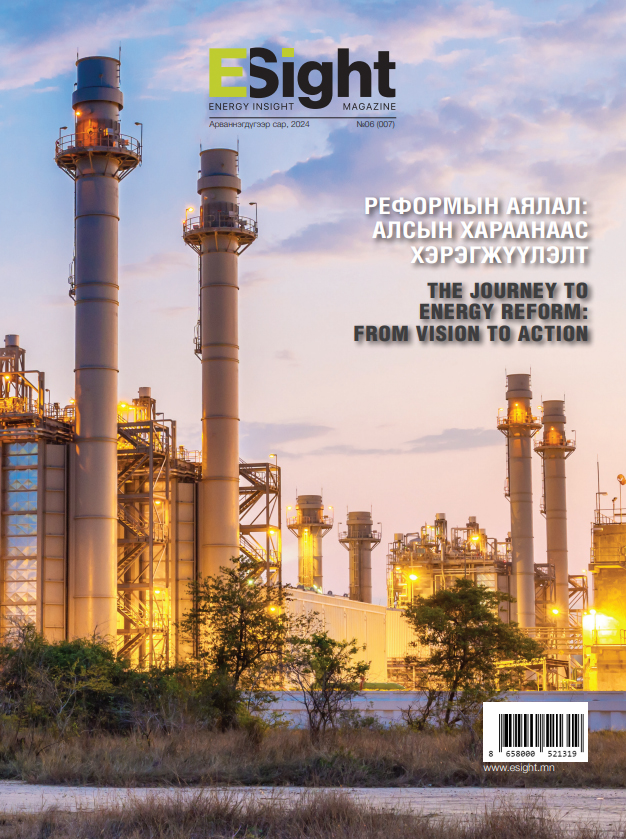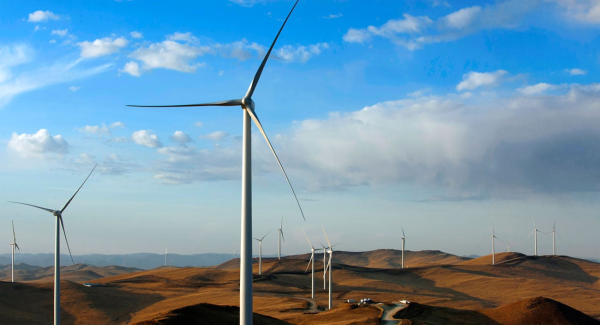
2024 marks the 50th anniversary of the diplomatic relations between the Federal Republic of Germany and Mongolia. During this historic anniversary year, Energy Insight’s E. Odjargal interviewed His Excellency Ambassador Helmut Kulitz, the Ambassador of the Federal Republic of Germany to Mongolia, about the economic cooperation between the two countries, particularly focusing on energy reforms and transitions. In the interview, Ambassador Kulitz emphasised that one of the most important aspects of liberalisation in Germany has been opening the country’s electricity market to suppliers from other European countries.
Your Excellency, we are deeply grateful that during this special time marking the 50th anniversary of diplomatic relations between Germany and Mongolia, you have kindly given an interview to Energy Insight magazine. First of all, we would like to express our gratitude for accepting our invitation and agreeing to give an interview. To begin with, could you please introduce your career path and diplomatic journey to our readers?
With pleasure, and thank you for the opportunity. My career path, in short, is as follows: Other than postings at the German Foreign Office in Berlin I spent many years on the African continent and also worked in Bulgaria, Vienna and, most recently, in Qatar where I was charged with heading our embassy in Kabul, the capital of Afghanistan. It´s been a mix of bilateral and multilateral diplomacy, including years of working in the OSCE in Vienna and with the United Nations. Also, I was privileged to be Ambassador of the European Union for four years. I´m very grateful that I´ve been given the opportunity to have had such a diversified and immensely interesting career.
This year marks the historic 50th anniversary of diplomatic relations between our two countries. The state visit of the President of Mongolia to Germany and the meeting with President Frank-Walter Steinmeier (February 7-8, 2024) was a moment to reflect on the relations between our two countries. At this juncture, how would you evaluate the level of cooperation between our two nations? This high-level visit not only elevated the half-century relationship between our countries but also brought it to a strategic level. How do you see this impacting future cooperation, particularly in economic relations?
Yes, the visit of my President last February – by the way the fourth state visit of a German president to Mongolia – was a highlight in our relations. We are very proud to have elevated our relations to the level of a strategic partnership. It is the formal expression of what we have achieved together in fifty years of fruitful cooperation in all fields – political, economic, cultural, scientific and others. And it is a compass for the future on which we will build. Regarding our economic relations: Just recently in mid November the German – Mongolian intergovernmental working group on business relation convened in Berlin, led on the Mongolian side by First Vice Prime Minister L.Gantumur. The purpose was to First Deputy Prime Minister cooperation and explore avenues for expanding it in the future. The government program 2024-28 and in particular its economic and business-related aspects – infrastructure development, the 14 mega projects etc. - played an important role during these talks. The future will show what we can do together. This refers first and foremost to mining, the energy sector, infrastructure development and logistics, but also to services, trade and other areas. There is a lot of potential. Now it´s up to our companies and business partners to leverage this potential.

Germany has made significant contributions to the development of Mongolia’s open, democratic, rule-oflaw, and civil society systems. In the current situation, a coalition government has been established in Mongolia. Germany has extensive experience in this area. Could you share some insights from Germany’s experience that would be particularly relevant in such times?
True, we have a long tradition of coalition governments in the Federal Republic of Germany. It is for us the norm, not an exception. And Germany has benefitted from this system, even though the current three-party coalition just fell apart after three years of governing together. In general, however, our electoral system has created stable, broad-based, centrist governments in which two or three parties are bound together by a common platform that they vow to jointly implement during their term. But coalitions are also hard work, because compromises have constantly to be negotiated and agreed between the coalition partners. This requires a firm will to find common solutions and, once they are found, implement them faithfully. In the heat of the political debate this is not always easy (laughs). After all, the coalition partners remain political entities with their own identity and ideological differences. Most of all it takes good faith and dedication to serve the country for the public good, and not for the good of the party or an individual. Of course, there is no magic formula, or the one perfect system, that makes a democracy work. At the end of the day, it depends on the actors and what they make of realities, that is how they further the public good in an inclusive, fair and transparent way that respects democratic norms and the supreme interest of the people. But multi-party coalition governments have the general advantage of encompassing a broad section of the political spectrum and the voters´will.
Germany has been one of the leading nations in providing development aid to Mongolia. In 2020, it was decided to end the official German-Mongolian development cooperation after more than 30 years, but this official cooperation has now been extended. What are the main areas of this development assistance, and how long will it continue?
We are proud of 30 years of close and very fruitful cooperation, and in all modesty: I think we have achieved a few milestones together. Since then, Mongolia has come a long way and is undergoing a fast transformation – the country just recently passed the threshold to “Upper MiddleIncome Country” in the World Bank classification. So, our cooperation will continue but also change, according to the country´s needs and our joint agreements with your government. Presently we focus on support to the energy sector, and more precisely energy transmission and energy efficiency, cooperation on forestry and biodiversity including support to protected areas, as well as private sector promotion and vocational training. We are also proud to be a partner in the German-Mongolian Institute for Resources and Technology (GMIT) in Nalaikh. GMIT is training and educating some of the brilliant young minds that help to advance productivity in the country.
Germany is actively involved in the global transition to clean energy. How is Germany managing its energy transition? Could you share insights into the changes, policies, and strategies in Germany’s approach, particularly regarding the potential of hydrogen? For instance, Germany used to import 40% of its gas supply from Russia, but it is now reduced to 0%. What opportunities exist for cooperation between Germany and Mongolia in the energy sector? How do you view Mongolia's efforts to reduce its energy dependence?
Thank you for this question. Since I am speaking with “e-sight” I trust that your readers will bear with me if I go a bit into detail. Germany started early on the path to decarbonize the energy sector, along with other sectors such as traffic, industry and housing, so we see some very positive results today. In electricity production the share of renewables, mostly wind and solar power, was 62% in the first half of 2024. For a highly industrialized country this is a respectable achievement. The share of renewables is going to rise further as new wind parks will open, some offshore our Atlantic coast. Concurrently, in order to further improve our CO2 balance, we´re focusing on phasing out our coal power plants. Currently they contribute about 20% to our electricity production, down from 26% last year, and their share will further go down in the years to come. Also, existing gas power plants are being retrofitted so that one day they can run on hydrogen. The use of hydrogen as an energy source is extremely promising in a whole number of sectors. It can be used in traffic, industrial production, electricity production etc. We want to be among the first who develop and use this technology in various applications and at an affordable cost. Our updated National Hydrogen Strategy of 2023 describes in detail which infrastructure we intend to establish so that the use of hydrogen can be introduced on a national scale.
And because we need to work towards climate neutrality, Germany will only use “green” hydrogen, i.e., hydrogen produced from renewable sources.
It is our established national goal to reach climate neutrality by 2045, i.e., five years before the target set by the European Union for its 27 member states. Regarding our gas imports: First of all, we have reduced our overall gas imports by about 45% between March 2022 and November 2023. Our primary suppliers today are Norway, the Netherlands and Belgium, plus a small share of LNG. Since August 2022 no gas from Russia has come through the North Stream 1 pipeline that was the supply route for Russian gas to Germany until Russia started its brutal war against Ukraine. In total, gas prices have come down dramatically after a sharp peak in the fall of 2022: In October 2024 the price for private consumers was about the same as in November 2021. Energy-intensive industries, such as the chemical industry, are working on better energy efficiency and alternative energy sources. Thanks to our high share of renewables, they also have a high base load capacity, so they can be fully integrated into industrial processes. Our car industry is a good example for that: All major German manufacturers have invested heavily in wind and solar parks to allow a clean transition to electric mobility and feed their own production processes.
What opportunities exist for cooperation between Germany and Mongolia in the energy sector?
Well, certainly in the use of renewables, how to introduce and establish them in the first place and how to run them efficiently, both on the policy and the technical level. We have a very large number of companies and experts that can provide their services as business partners. Also, as I said above, one of the three pillars of our development cooperation is energy, with a focus on renewables and grid efficiency. If we succeed in linking the strengths of our private sector with all their technologies and know-how with the common political goal to transition away from fossil fuels – the goal agreed at the COP 28 last year in the United Arab Emirates – we can achieve a lot together. With regard to Mongolia's efforts to reduce its energy dependence: Well, we think that renewables can also help tremendously in reducing Mongolia´s electricity imports. Decentralized, small-to-medium scale off-grid solutions complementing the national grid can be extremely helpful in providing power to remote communities at a very reasonable cost. And renewables can be installed quickly and without causing major ecological damage. We believe renewables could be a formidable opportunity to improve Mongolia´s energy autonomy in a relatively short time, and improve its climate balance at the same time. Strategically it is of course in the best interest of every country to have energy sovereignty to the maximum extent possible.
What is Germany’s current policy regarding nuclear energy?
Well, as you may know Germany has a very skeptical attitude towards nuclear power. As a matter of fact, we shut down the last three nuclear reactors in the spring of 2023. In 2011, before the Fukushima incident, we had 17 reactors which at their peak provided roughly 25% to Germany´s electricity production, but they have all been phased out since. This shutdown has been fully offset by the massive investment in renewables. Our position is that today´s advanced renewables are far superior in terms of safety and security, but also in terms of cost-efficiency, to the products of the nuclear industry. We consider nuclear power plants intrinsically unsafe, no matter how small the mathematical probability of a “big” accident. So-called “lesser” events such as leaks of radioactive water, fuel rod damage, structural failures or safety system failures occur frequently and can lead to releases of low-level radioactivity into the environment. The issue how to dispose of nuclear waste, especially high-level waste stemming from spent rods and materials from nuclear reactors, is one of the most challenging aspects of managing nuclear energy, as is the dismantlement of retired reactors. And the industry is also negatively affected by climate change: During the summer of both 2022 and 2023 a number of nuclear reactors in Europe had to be shut down or faced restrictions because rivers, whose water is needed to cool the reactors, experienced significant drops in water flow. If you take the staggering cost of nuclear reactors and the time it takes to plan and build them – usually at least 10 years from planning to operation – it is clear that this technology, in terms of its intended output, cannot deliver a speedy solution, while it requires considerable capital investment upfront. Compared to how easily and quickly renewables can be rolled out, simply bypassing all the security hazards and environmental risks of the nuclear industry, we think the choice is really quite obvious.
The Mongolian government has announced reforms in the energy sector. Could you talk about Germany’s experience with energy liberalization and how this approach has been implemented?
The most important liberalization that I can remember is when the German electricity market was opened up to providers from other European countries. This started in 1996 in the framework of European integration that made it mandatory to have European competition under EU law. The opening of European markets, along with the “unbundling” of generation, transmission and distribution to allow fairer and more transparent competition was a crucial part of this reform. Today, while we have regulatory bodies, the price formation is essentially on and by the markets, i.e., regulated by supply and demand with oversight by our regulatory and consumer protection agencies. This is a good example of how European citizens have benefitted from European integration, in terms of improved efficiency, reduced consumer prices and better energy security across Europe. Of course, this is not transferrable to the Mongolian context. But one commonality is that Mongolia, with the decision to gradually adapt its electricity prices to the actual cost of production, transmission and distribution, is now going down a similar path of marketorientation. It is important that these calculations include not only the running or operational costs, but also the initial investment, the capital cost, and the retirement cost at the end of the life cycle. We believe that this kind of liberalization is the right thing to do, although, of course, it´s never popular. But ultimately, assuming that the reduction in subsidies is used productively, for example for investment in education, health or improving the country´s infrastructure, it is undoubtedly beneficial for the country.
How interested are German companies in entering Mongolia’s energy sector, particularly in renewable energy? What challenges do you foresee for new investors entering Mongolia’s market? What are your thoughts on the existing investments from Germany in the energy sector, and which new directions might be pursued?
With the arrival of the new government and the government action plan 2024-28, some companies are certainly keeping their eyes open, based on the assumption that there is now more openness for a dynamic and forceful energy transition in Mongolia than before. In the past conditions were not conducive to attracting investors. As you probably know, Mongolia did not score well in the Energy Transition Index published by the World Economic Forum last June, with rank 116 out of 120 countries, and this is reflected in the foreign investment activity in the sector, which is very low. Our companies´ experiences have been, let´s say mixed. We hope that this will be changing now. It is key that all actors involved are really on the same page.
To deviate from the energy sector for our last question: Mongolia’s ambition to diversify its economy based on its natural resources aligns with Germany’s goal to diversify its raw material sources. In this context, do you see potential for expanding private sector cooperation, particularly in the critical minerals sector? Is there room for deepening this cooperation?
Well, there is definitely room for deepening this cooperation! At the beginning I mentioned the recent meeting of the intergovernmental working group established in the framework of our raw minerals partnership that Mongolia and Germany agreed on in 2011, co-chaired by First Deputy Prime Minister Gantumur in Berlin. It was preceded by the private sector-led joint economic committee. Of course, mining was an important topic during these talks. As was processing! You may know that our common goal is to not only focus on exploration and extraction, but also on processing. The German – Mongolian Institute of Technology in Nalaikh focuses on processing. We see an opportunity for Mongolia to improve its value chain in the mineral sector, and yes, German industry and science have extensive knowledge of metallurgy. So, in a way we should be the perfect match (smiles).
Thank you very much.

Energy Insight Magazine, 2024 №06 (007)














